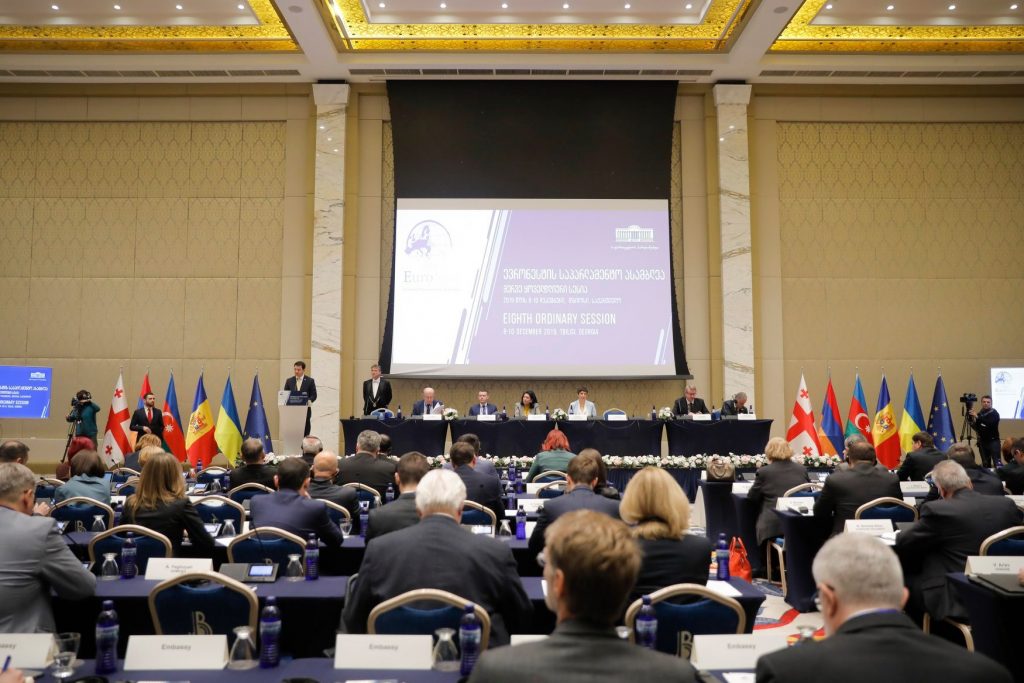On December 8-10, Georgian capital Tbilisi is hosting the 8th Ordinary Session of the Euronest Parliamentary Assembly, an annual forum for members of the European Parliament and parliaments of the Eastern Partnership nations.
At its formal opening ceremony today, Georgian Parliament Speaker Archil Talakvadze spoke of Georgia’s “firm dedication to the values and principles that Europe holds dear.” He said, the current constitution “solidified the strong popular support of European and Euro-Atlantic integration and now clearly states that integration into the European Union and NATO is Georgia’s top foreign policy priorities.”
Talakvadze mentioned ongoing electoral dispute as well, saying that a year ago “the parliament of Georgia made landmark decision to shift to the fully proportional election model from the existing one in 2024.” However, “regrettably,” he said, “the Parliament of Georgia recently fell short to change the date for proportional elections making it earlier in 2020.”
He then also referred to the “continued Russian occupation” of Georgian lands and “its destructive and aggressive activities,” as well as mentioned the recent detention and sentencing of Georgian doctor Vazha Gaprindashvili, who remains in Tskhinvali custody for a month now.
President Zurabishvili also raised Gaprindashvili’s detention in her remarks, urging the Euronest PA “to join many humanitarian appeals that have been made in support of doctor Vazha Gaprindashvili’s immediate release.” “I’m confident that my plea will be heard by you here present, and, hopefully, by those, who have to take the one and only sensible decision that of release,” she said.
Zurabishvili also spoke of polarization of society as “the gravest internal challenge” that Georgia is facing nowadays, and how she has been “trying to combat” that since her inauguration. “We have to combat the polarization, all of us, different political parties, the society itself, the media and of course the authorities of the countries,” she said, noting that otherwise, “no society that is so utterly divided can overcome its main existential challenge” of Russian occupation.
Vice-President of the European Parliament Klára Dobrev (Hungary, S&D) also addressed the audience on behalf of new President of the European Parliament David Maria Sassoli. According to Dobrev, the assembly meeting “takes place at a time, which is anything but not easy… for Georgia.”
Speaking on how polarized politics is getting, Dobrev said “life is complex,” and individuals have to make “complex decisions” in their lives, however, “what we have learned from history [is] that all problems, complex problems can be solved together, through dialogues, conversations, compromises.”
“No political party represents a nation alone. No one. Political parties together do. And then itself this fact itself calls for discussions and compromises,” she said, adding that “the way the government treats its opposition, is the way how the opposition will treat its opposition when it comes to government.”
According to Dobrev, the same refers to opposition as well. “The way opposition is using its tools in order to show its political opinion, is the way and gives example to future oppositions,” she said, adding “that’s democracy.”
In his today’s remarks, Co-President of the Euronest PA Andrius Kubilius (Lithuania, EPP/Christian Democrats), also underscored that this year is important as its celebrates the tenth anniversary of EaP, and that success of EaP countries is “big step forward” to having the vision of Europe “whole, free and at peace” really implemented.
Kubilius said, the success of each EaP country would be an example for ordinary Russian citizens as well to ask their political leaders why their country is “still struggling without proper democracy.” “In some way, EaP’s success is also an instrument how to assist Russia to achieve some kind of transformation back to more democratic development,” he stated.
The Parliamentary Assembly has 60 Members of the European Parliament and 10 members from each of the following Eastern Partnership countries: Armenia, Azerbaijan, Georgia, Moldova and Ukraine.
This post is also available in: ქართული (Georgian) Русский (Russian)

